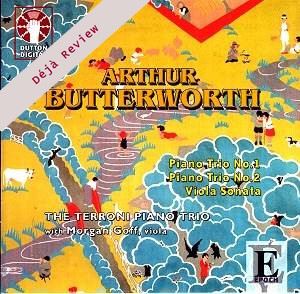
Déjà Review: this review was first published in June 2006 and the recording is still available.
Arthur Butterworth (1923-2014)
Piano Trio No.1 Op.73 (1983) [21:06]
Viola Sonata Op.78 (1986) [18:26]
Piano Trio No.2 Op.121 (2004) [16:13]
Terroni Piano Trio
Morgan Goff (viola)
rec. 2005, All Saints Church, East Finchley, London
Dutton Epoch CDLX7164 [56]
Born in 1923, Arthur Butterworth received his musical training at the Royal Manchester College of Music after army service in the Second World War. Amongst other orchestral positions he played the trumpet in the Hallé Orchestra under Barbirolli and here, like Malcolm Arnold before him, he became totally immersed in orchestral sound and was able to acquire a formidable orchestral technique. His major influences were Sibelius, Bax and Elgar. His First Symphony was premiered at the 1957 Cheltenham Festival of Modern British Music by Barbirolli and subsequently received many performances in the UK before being consigned to the scrap heap by the anti-tonal musical establishment of the time. In an article on The Younger Generation (of English Composers) in the Musical Times (March 1960) Butterworth, amongst others, was invited to give a brief insight into his musical career and most important compositions. He stated that “my main purpose is not to be concerned with musical fashionable techniques for their own sake; mathematical or pseudo-scientific music holds no interest for me for it is my belief that music should be the direct outcome of personal experiences and is of no value whatsoever if it is contrived and merely calculated note-spinning”. He goes on to say that “it is concerned primarily with the contemplation of the unchallenging omnipotence of nature in all its diverse moods …..” He subsequently left the Hallé to take up the position of conductor of the Huddersfield Philharmonic Society and taught in the music department of Huddersfield Polytechnic, subsequently University, until 1993. I would be interested to hear what he thought of the musical goings-on of Steinitz’s emerging Huddersfield Contemporary Music Festival!
Butterworth’s musical philosophy comes across strongly on this disc of chamber music, sympathetically realised by the Terroni Piano Trio with Morgan Goff (viola). Interestingly, these are all late works by a composer more used to writing symphonies, large-scale choral and orchestral works and compositions for brass band. The Piano Trio no. 1 (1983) was written at the behest of Sir John Manduell and is the first work that Butterworth had composed in this genre at the tender age of 60 – although it certainly doesn’t show! It is a wonderfully constructed, pensive, cool and restrained work. The overall impression is dark, introverted and mysterious. I felt that the ‘vigoroso’ of the first movement was not really conveyed in either the music or the performance; imagine what it would mean in Shostakovich’s hands! However, the Terroni Piano Trio captures the seamless, lyrical and elegant writing for the instruments most beautifully.
I was also impressed by the Viola Sonata (1993), which followed hard on the heels of the fine viola concerto of 1992. Goff’s playing is excellent and his rapport with Terroni is most impressive, especially in the scherzo. Yet again, the passion of the opening movement (marked ‘Appassionato’) is not really conveyed in either the writing or the performance – although this surely just represents the understated writing of the composer rather than a defect in the playing.
The disc finishes with the Piano Trio no. 2 (2005), which is given a sympathetic but, again, slightly restrained performance. Altogether, this disc offers useful insights into the music of Arthur Butterworth in what is a valuable contribution to modern British chamber music. I was delighted to come across such tuneful and tonal works from a contemporary composer, and such accomplished and suave playing from the Terroni Piano Trio.
Em Marshall-Luck
Help us financially by purchasing from



















